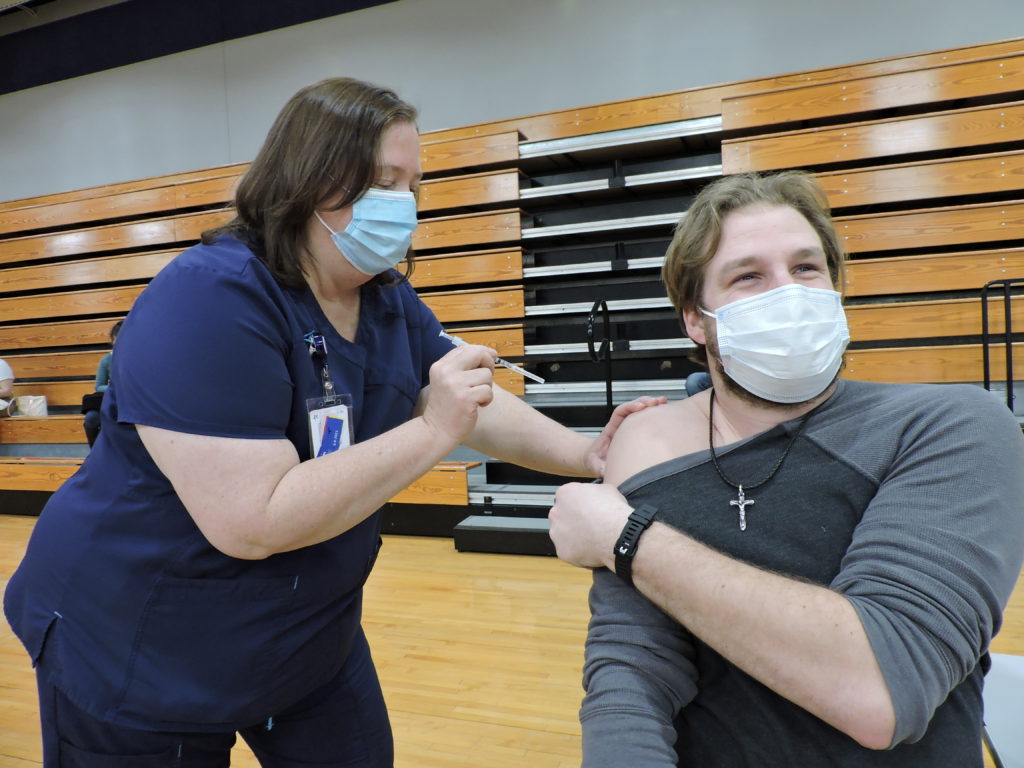
The Family Health Care and Minor Emergency Clinic at OCU has begun to administer COVID-19 vaccinations for the campus community.
The first vaccination clinic was Feb. 27 and gave 50 community members the first dose of the Pfizer-BioNTech vaccine. The second clinic was March 5, and an additional 200 community members received their first dose.
The first two vaccination clinics prioritized individuals who meet at least one of the following criteria:
- Individuals who will be 65 or older before 12/31/2021
- Any adult with severe comorbidities as defined by the Oklahoma State Department of Health (asthma, cancers, chronic lung disease, diabetes, chronic kidney disease, heart disease, high blood pressure/hypertension, obesity, Down Syndrome, mellitus or chronic liver disease)
- Any adult at high risk of mortality and severe morbidity resulting from a COVID-19 infection as determined by a physician
- K – 12 teachers or any staff working in K – 12 schools
- Any adult eligible in Phase 1
On March 8, Oklahoma opened Phase 3 of the vaccination distribution plan, which includes all faculty, staff and students in educational settings outside of pre-K, including colleges and universities.
On March 12, the clinic administered 60 vaccines, prioritizing OCU faculty and staff.
The clinic will administer its greatest number of vaccines yet on March 19. They are planning to administer 750 Pfizer-BioNTech vaccines to the campus community. These 750 doses account for both community members receiving their first dose and members receiving their second doses from the clinic on Feb. 27 or from an off-campus vaccination site.
Those eligible to receive the vaccine on the March 8 and 12 clinics meet at least one of the following criteria:
- Any teachers, students, residents and administrative staff in all educational settings (colleges, day care, etc.)
- Critical infrastructure personnel (“essential business/industry” personnel) as specified in the governor’s third executive order
- Any adult eligible in Phase 1 or Phase 2
Levi Harrel, dean of students, said vaccination clinics will continue to happen weekly on campus as needed by campus demand as long as there is vaccination supply. Harrel said the supply is determined by the state health department.
“The vaccination clinics that we have done so far have gone overwhelmingly well,” he said.
Harrel said he hopes to be able to vaccinate everyone who wants to be vaccinated on campus.
“At this point there is no guarantee, though there is good faith we’ll be able to receive all the supply we need,” he said. “It is certainly my hope that we will be able to meet the full need of the campus community and that those who are choosing to be vaccinated will have the opportunity to do so here on campus.”
Community members who register will be accepted in the order applications are received, and Harrel said those who did not make the cutoff will be placed in a queue for the next available clinic.
Christopher Maxwell, clarinet performance sophomore, said he had a great experience when he got his first dose of the vaccine at the March 5 clinic. He said he’s glad the university is making vaccinations available to the campus community.
“I think it’s fantastic. I think it’s very generous, and I think it’s a wonderful opportunity for students, teachers and anyone who works here to get their shot,” he said. “For instance, I’m in Phase 3, and I was able to get my vaccine before Phase 3 opened up.”
Maxwell said getting vaccinated is a step towards ending the pandemic.
“I think everyone should receive the vaccine. Obviously, coronavirus has become a very scary reality in which we live, and, I was actually discussing this with a friend yesterday, there’s a sort of comfortability we have reached with COVID that I think is honestly really scary. I think everyone is ready for this to be over and return to normalcy without all of this scary stuff happening,” Maxwell said.
Nick Atkins, music theater senior, said he volunteered at the March 5 clinic. As a volunteer, Atkins said he helped check people in and made calls to people who had signed up to get vaccinated but didn’t show up yet.
“It was really fun honestly,” he said. “I really want to help in any way I can to help the vaccine rollout go as smooth as possible, especially on campus. It was great to see so many OCU people and the OCU community start to get their vaccines.”
Atkins said he highly recommends signing up to volunteer at upcoming vaccination clinics.
“I think this is a big, historical event, and it’s always going to be a pretty big event in our lives, so it’s cool getting the opportunity to say, ‘I helped people get their vaccines,’ and helping out in any way possible,” Atkins said.
Though volunteers were not guaranteed a vaccine, Atkins said he received his first dose because there were extras that day. He said he feels like he’s seeing the light at the end of the tunnel.
“It was just amazing. Everyone was super excited and happy and kind of relieved,” Atkins said. “We know we need to wait at least two weeks after the second dose until we’re actually immune to anything, and even then, we know we can’t just go everywhere without a mask, but it’s nice knowing the light’s at the end of the tunnel.”


Leave a Reply